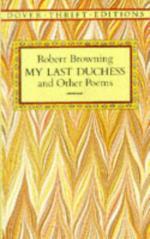|
This section contains 778 words (approx. 2 pages at 400 words per page) |

|
Pride
The speaker's overbearing pride-or in moral terms, his hubris-is incorporated into the very situation of Browning's monologue. In it, the Duke addresses an inferior, the emissary of a nobleman ("the Count, your master") whose daughter he intends to make his second wife. There are financial negotiations at stake-the matter of a dowry that the Duke intends to collect from the Count. In fact, the Duke seems in the process of acquiring in the next Duchess an "object," to use his own word. But the actual amount of money is not the real issue. The Duke suggests that among noblemen, whose behaviors are governed by "just pretense," no reasonable monetary request would be denied; the negotiations, then, are in one sense a mere formality. In a second sense, however, money functions symbolically, both in the Duke's mind and for the reader trying to understand the Duke's motives. In his...
|
This section contains 778 words (approx. 2 pages at 400 words per page) |

|




